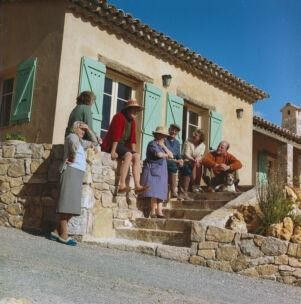Julia Child in Grasse
- Tom Richardson
- Apr 11, 2025
- 5 min read
Updated: Jul 30, 2025
Julia Child (1912-2004), for those of you who (like me until recently!) have never heard of her, was the pioneer American ‘TV chef’. She lived part-time in Plascassier, which is part of our commune, from 1965-1992, and she clearly loved the old town of Grasse.

This is part of Julia’s story, using extracts from her book ‘My Life in France’*, written with her great nephew.
She arrives in Paris in 1948 with her husband, Paul, who works for the US Foreign Service. In winter 1949 they visit the Cote d’Azur. They clearly returned via the route Napoleon:
"On the return loop to Paris, we crossed over the mountains, and the scenery changed dramatically. Grasse, a hothouse filled with flowers, gave way to great barren limestone ridges, like hardened taffy, and tumbling rivers that were a bright aqua-blue color from the glacial melt."

In Paris, she enrolls on a Cordon Bleu course and meets her future collaborator, Simone Beck Fischbacher (known as ‘Simca’, apparently after a well known car brand of the time!), whose husband’s family own an old mas in Plascassier. The husband, Jean, works for a famous Parisian perfume company, L-T Piver, which was historically closely associated with Grasse. You can see many of their perfume bottles on display in the twentieth century section of Grasse's Musée International de la Parfumerie.
Julia decides to turn a mass of recipes from Simca and another French friend into a cookery book for Americans and successfully, if rather obsessively, tests and refines every dish. After ten years, during which she accompanies her husband on postings to Marseille, Germany, Norway and finally home in the US, her book ‘Mastering the Art of French Cooking’ is published and she embarks on a big publicity drive. Fortunately for her, her timing coincides with television first being widely available in the US, although: "As Paul and I didn’t have a television yet, we knew nothing about it…"

Despite that, her publicity efforts are very successful. She becomes one of the first ‘television chefs’ and ultimately an American icon. The English equivalent might be an unlikely cross between her close contemporaries Elizabeth David (1913-1992) and Fanny Cradock (1909-1994)!
She’s not at all keen on the coast of the Cote d’Azur: "such a spate of plaster-splashed neo-Med box houses and pleasure domes crowded next to an unending row of tourist traps, cheap knickknackeries, Coca-Cola signs, and sleazy bouillabaisse parlors".

But in 1965, Simca and her husband allow her to build a house, to be known as ‘La Pitchoune’ or, more famously, ‘La Peetch’ on part of their land: "In front of the house stood a lovely tree-shaded terrace that looked across a valley toward the flower fields and tall, swaying cypress trees of Grasse, an area famous for its perfumes."
Unlike Dirk Bogarde, she and her husband have already lived in France for some years, and their house is built under the aegis of Simca’s family, but even she does have problems: "La Peetch was as cold and dark as a dungeon. It took hours to get the radiators working, sweep out the cobwebs, and replace the burned-out lightbulbs. The carpenter and mason had done their work, but the plumber and electrician had yet to appear—and when they did, they discovered that our new dishwasher had the wrong voltage and was missing certain pieces….We shrugged."
In 1970, she starts shooting a new series of her TV program ‘The French Chef’.

"We began our first morning of shooting in the market at the Place aux Aires, in Grasse. Peter, our … cameraman, wanted to film me buying fruit, vegetables, flowers, and crème fraîche. It all went smoothly until our bright lights and dragging electrical cables bothered one of the market women….“How am I supposed to sell my carrots and be a movie star, too?” she scolded us. “Here I am, surrounded by Hollywood, and only two more hours to sell—how are my customers going to buy anything? … No! This is too much! Enough!”".
But that clearly doesn’t put Julia off Grasse: "....to Grasse. What a fabulous city! Jim and I bought fruit in the Place aux Aires, while Paul snapped pictures…., and then we strolled slowly through the crowded medieval streets, taking in the layers of history and smell and sound. We returned to the car laden with swollen shopping bags…"
Naturally, she is good friends with local restaurateurs, most notably Roger Vergé at the now defunct Moulins de Mougins. Her description of the view from a restaurant in Plascassier sounds very much like what is today the Bistrot Lougolin.

She suffers from unwanted intrusions: "…the International Herald Tribune had published an article by a former colleague of Paul’s, who wrote about knowing us in the old days and how to find La Pitchoune. This was irritating, especially after two sets of American tourists and a Canadian family in a minibus drove right up our driveway asking for us.".
After the death of Simca and Paul’s having to enter a nursing home in the USA, she decides, quite unsentimentally, to give up La Peetch. She finally leaves in 1992, when she is eighty years old.
Today the house is a holiday home and, quite appropriately, a cooking school. It is very popular with Americans, for whom Julia Child remains an emblematic figure. I am indebted to Chris Nylund, whose wife Makenna runs the school, for telling me about Julia Child in the first place and then for directing me to the photographs in the Schlesinger collection.
*’My Life in France’, Julia Child and Alex Prud'homme, 2006, Knopf Publishing Group


Comments